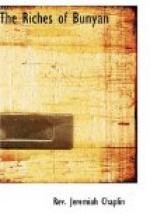There are providences of two sorts, seemingly good and seemingly bad; and those do usually as Jacob did when he blessed the sons of Joseph, cross hands and lay the blessing where we would not. There are providences unto which we would have the blessings entailed; but they are not. And these are providences that smile upon the flesh, such as cast into the lap health, wealth, plenty, ease, friends, and abundance of this world’s good: because these, as Manasseh’s name doth signify, have in them an aptness to make us forget our toil, our low estate, and from whence we were; but the great blessing is not in them.
There are providences again, that take away from us whatever is desirable to the flesh; such are sickness, losses, crosses, persecution, and affliction; and usually in these, though they shock us whenever they come upon us, blessing coucheth and is ready to help us. For God, as the name of Ephraim signifies, makes us fruitful in the land of affliction. He therefore, in blessing his people, lays his hands across, guiding them wittingly and laying the chiefest blessing on the head of Ephraim, or in that providence that sanctifies affliction. Abel-what to the reason of Eve was he, in comparison with Cain? Rachel called Benjamin the son of her sorrow; but Jacob knew how to give him a better name. Jabez, also, though his mother so called him because, as it seems, she brought him forth with more than ordinary sorrow, was yet more honorable, more godly, than his brethren.
He that has skill to judge of providences aright, has a great ability in him “to comprehend with other saints what is the breadth and length and depth and height;” but he that has no skill as to discerning them, is but a child in his judgment in those high and mysterious things. And hence it is that some shall suck honey out of that at which others tremble, for fear it should poison them. I have often been made to say, “Sorrow is better than laughter, and the house of mourning better than the house of mirth.” And I have more often seen that the afflicted are always the best sort of Christians. There is a man never well, never prospering, never but under afflictions, disappointments, and sorrows; why, this man, if he be a Christian, is one of the best of men: “They that go down to the sea, that do business in great waters, they see the works of the Lord and his wonders in the deep.”
I do not question but that there are some that are alive who have been able to say the days of affliction have been the best unto them, and who could, if it were lawful, pray that they might always be in affliction, if God would but do to them as he did when his hand was last upon them; for by them he caused his light to shine.
Oh how should we, and how would we were but our eyes awake, stand and wonder at the preservations, the deliverances, the salvations, and benefits with which we are surrounded daily, while so many mighty evils seek daily to swallow us up as the grave!




